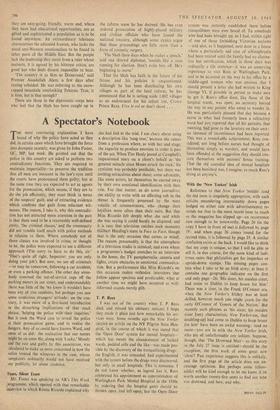rears, Silent Tears Mr. Foster was speaking on AR's This
Week programme, which opened with that remarkable interview in which Ronna Ricardo explained why she had lied at the trial. I am chary about using a description like 'rang true,' because she comes from a profession where, as with bar and stage, the capacity to produce emotion to order is part of the act. When Tim Healy jeered at Campbell's impassioned tears on a client's behalf as 'the greatest miracle since Moses struck the rock,' his cynicism was probably .justifiable, but there was nothing miraculous about them; some advocates, like some actors, let themselves be carried away by their own emotional identification with their. role. For that matter, so do some journalists; the ability to write with an affecting sob in the throat is frequently possessed by the most volatile of commentators, who change their loyalties more often than their suits. But that Miss Ricardo felt deeply what she said while she was saying it could hardly be disputed; and it is rare that television catches Such moments (Gilbert Harding's tears in Face to Face, though that is the only occasion that comes to mind). The reason, presumably, is that the atmosphere of a television studio is inimical; and even where a programme's budget stretches to an interview in the home, the TV paraphernalia, camera and lights, create obstacles to emotional communica- tion. But a performance like Miss Ricardo's on this occasion makes orthodox interviews that follow appear specious and predictable; what at another time we might have accepted as well- informed sounds merely glib.






























 Previous page
Previous page